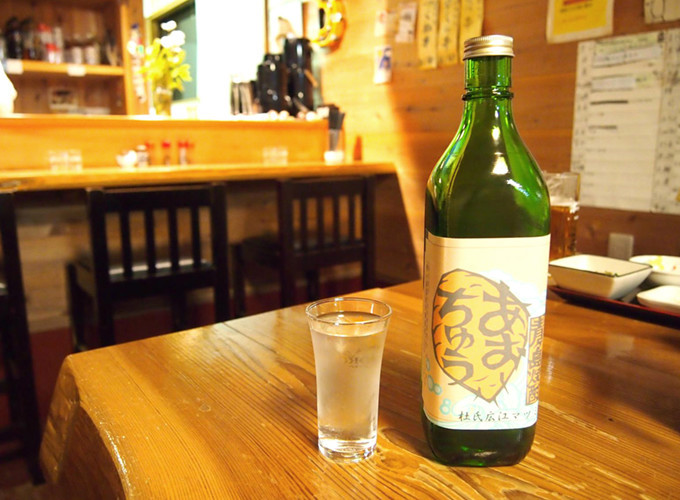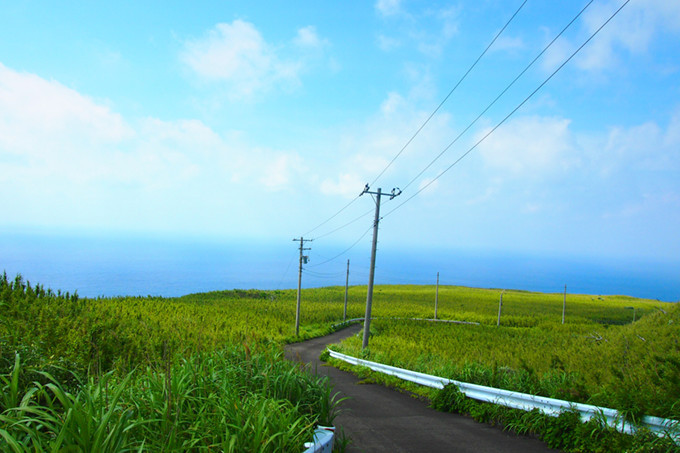Very unique shape formed by multiple volcanic activities in the past. Aogashima island. Source: Charly W. Karl
'Aogashima Volcanic Island' is located in the archipelago of Izu islands and is the southernmost Japanese island in the Philippine sea. This island is one of the least inhabited place on Earth, supporting life in various forms.
History:
The history of human settlement on Aogashima is uncertain. Most of the people in Aogashima are Japanese. The island is mentioned in Edo period records kept at Hachijō-jima, which record volcanic activity in 1652, and from 1670–1680. An earthquake swarm in July 1780 was followed by steam rising from the lakes in the Ikenosawa Caldera. Further earthquakes in May 1781 led to an eruption. In April 1783, lava flows from the Maruyama cone resulted in the evacuation of all 63 households on the island. During a massive eruption in 1785, some 130–140 of the population of 327 islanders perished.
Dimensions of Aogashima Island:
Aogashima Island covers an area of about 8.75 square kilometers with a coastline nearly as long as 9 kilometers. The highest elevation is 423 meters creating a stunning view at the top.
The island is 3.5 km in length and 2.5 km in width, formed by overlapping remnants of at least four submarine calderas. The island is surrounded by steep rugged cliffs which is formed by the volcanic deposits.
Notable places :

There are mainly 2 notable places which offers a significant view and adds a specialty to this Aogashima island. One is the 'Ikenosawa' which is raised sharp cliff forming a bowl like creation with a diameter of 1.5 kilometers. This steep cliff is used as a slant ground for cultivation by the inhabitants and has been living depending on the harvest.
Another place is the 'Otonbu' which is the highest point on the island which is 423 meters high.
Who administers the Island?
This island is administered by the Tokyo metropolis under Hachijo Subprefecture. The whole island falls in the boundaries of Fuji-Hakone-Izu National park. Majority of the people living are Japanese and their origin is uncertain. As recorded, the volcanic eruption in 1785, took 138 lives.
Beauty of Aogashima Volcanic Island :
Great night view on the Aogashima island Source: Gurunavi

Aogashima Shochu local alcohol (ca 30%) "Aochu" There are some restaurants(izakaya) in Tokyo(city area) to serve Aogashima local Shochu. Source: Gurunavi

Nature on Aogashima island Source: Gurunavi
The island ‘s Road
One of the island’s hot spots
Inside The island
Inside The island
Inside beauty of The island

Inside beauty of The island
Beauty of The island
Outside Beauty of The island
Inside beauty of The island
How to Get There?
First, you need to get to Hachijo-jima. You can take a flight from Haneda in Tokyo on ANA or a ferry from Takeshiba port. Once in Hachijo, you have two options. The first is the helicopter (recommended). Tickets can be purchased at the TAL counter in the Hachijo airport. The flight takes about 20 minutes, and leaves Hachijo once a day (be sure to check in half an hour before to keep your seat).
Where to Stay?
I recommend the minshuku Aji Sai, but I can’t find the direct phone number. There are a few other minshukus on the island, and all provide meals with your stay. There are no restaurants on Aogashima. There is also a free campground on the volcano, but be sure to bring your own food if you stay there. Call the village office for more information on where to stay: 04996-9-0111
What to Do?
Definitely plan a day to hike around the volcanoes. Be sure to check out the trails that lead up from Aogashima town (where all the buildings are), because the trails there are well-marked and easy to climb. Also, sit for a spell in the volcano-powered sauna. Near the sauna, check out the salt shop where Aogashima’s famous salt is manufactured. Since the town sits on steep cliffs, getting down to the ocean to swim isn’t all that easy. You can splash around near the harbor, though. Keep your eye out for dolphins.
What to Buy?
Aogashima is famous for two things: salt and shochu. The salt is made by slowly drying ocean water over the volcanic vents. And I can attest that it is delicious. The shochu (or aochu) is different from any other Japanese shochu I’ve tasted. It’s hard to describe the taste, but give it a try.
No comments:
Post a Comment